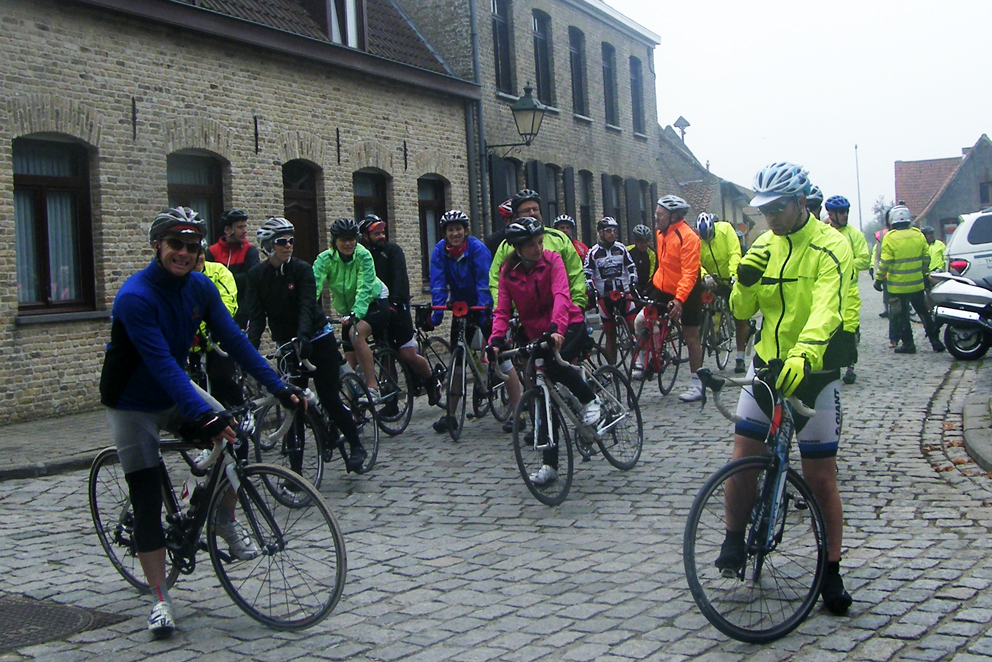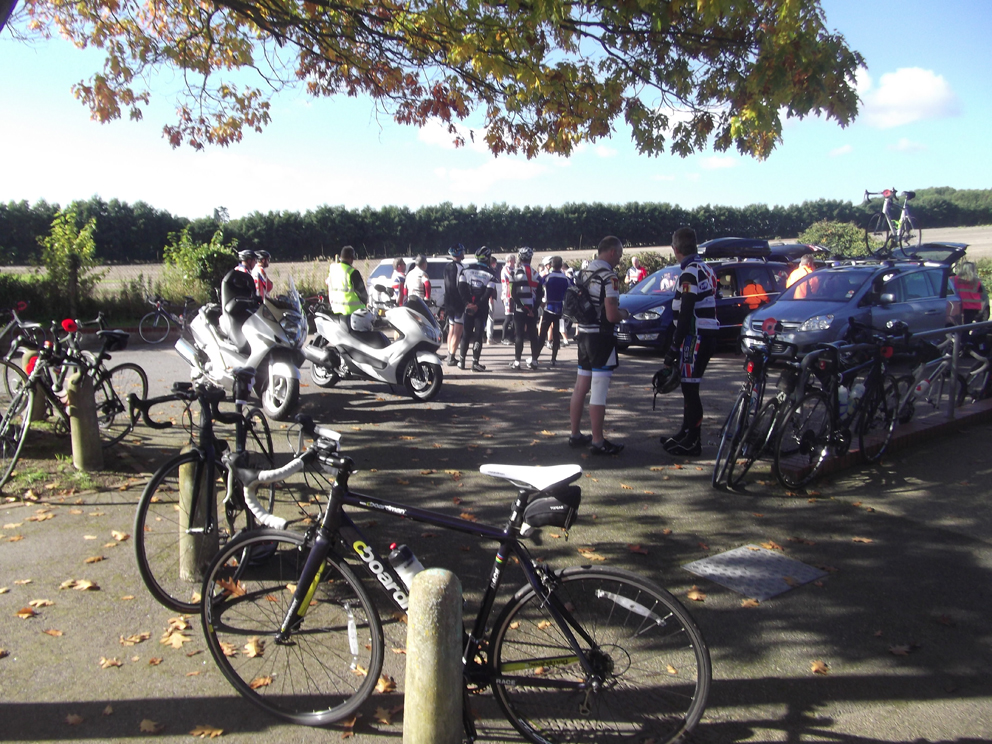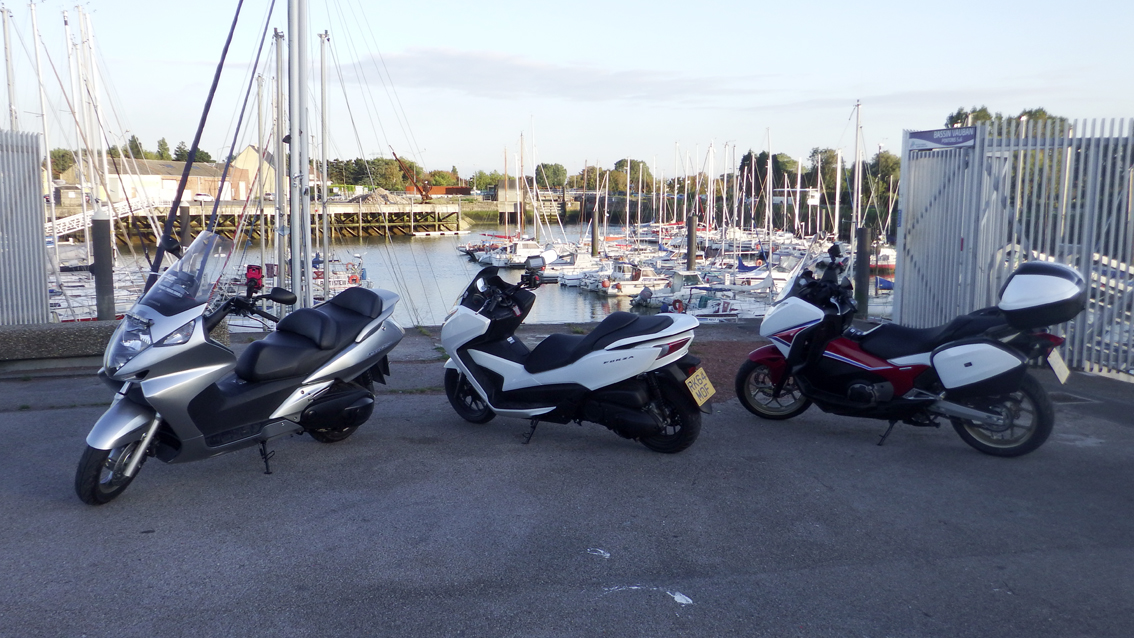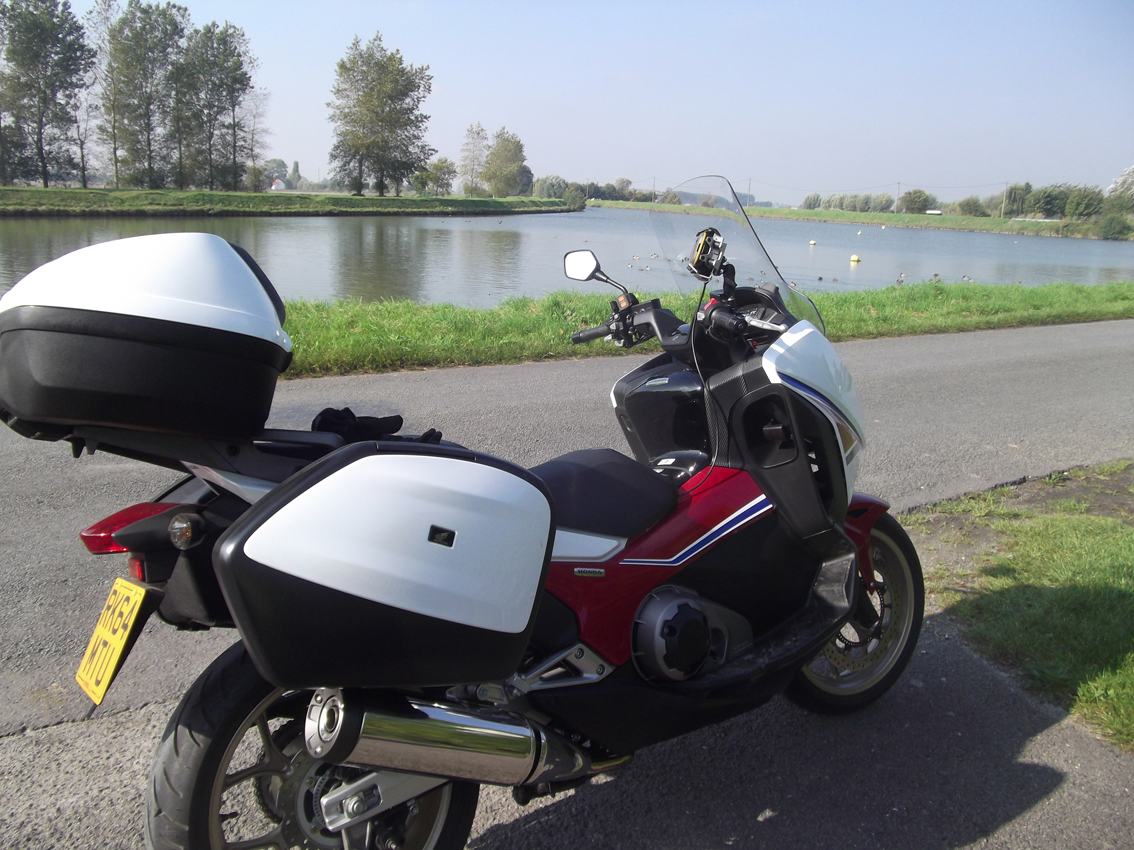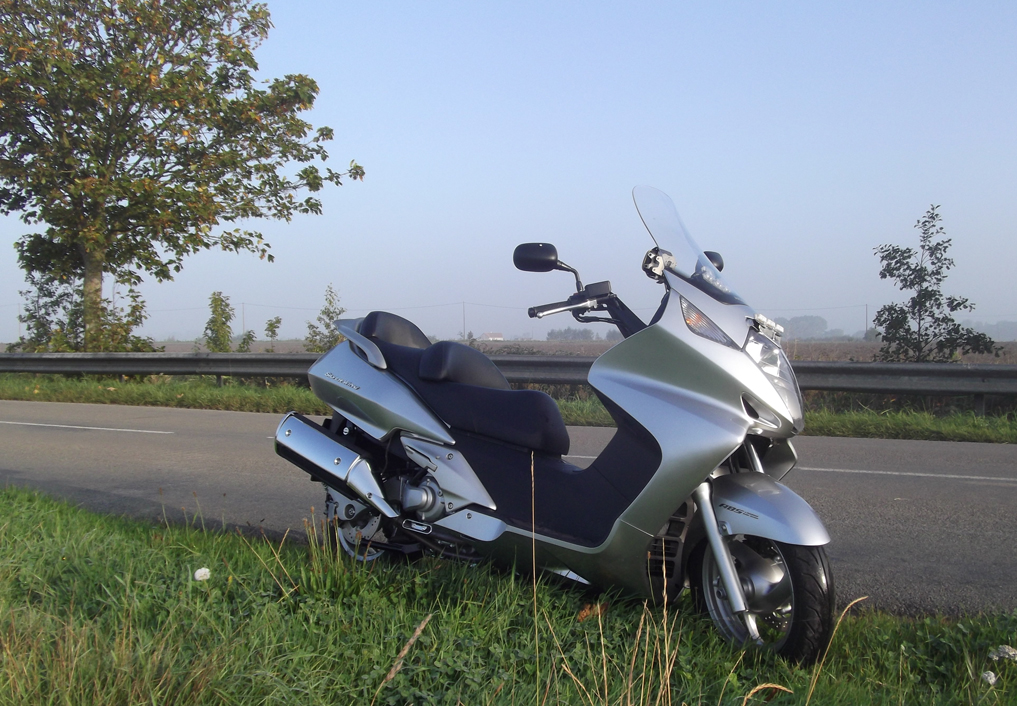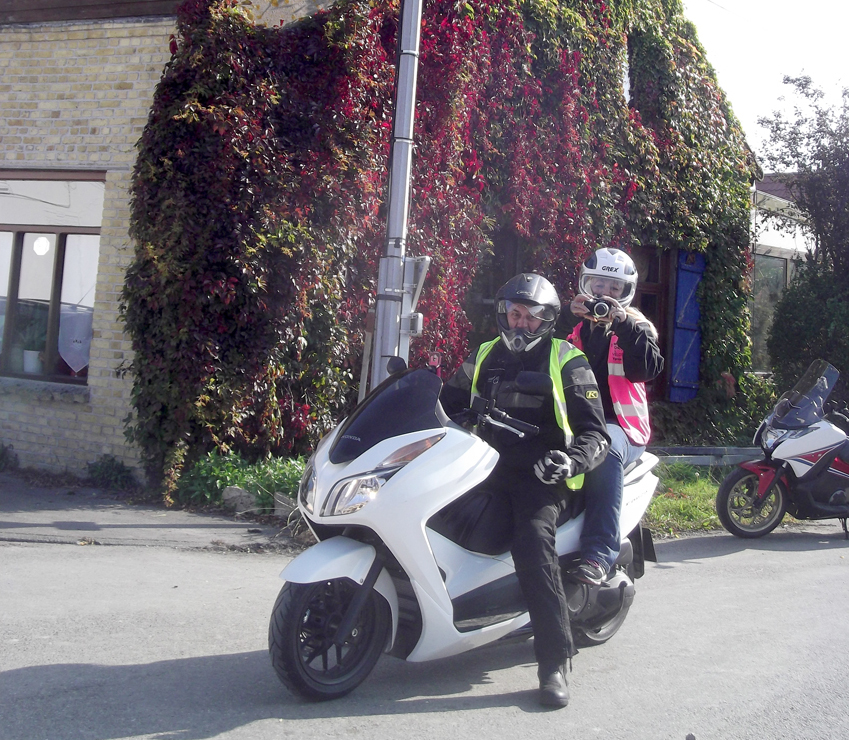Tour de Flandres
part one
Dave Newman
I wonder how many of you motorbikey people have watched the Tour de France and similar events, seen the “outriders” whizzing to and fro and thought 'I can do that. Giz a job'? The opportunity arose for us when Milky was asked by his rugby club if he could provide some people to help with their sponsored cycle ride to Ypres, in Belgium. It would have been rude to say no.
And so it was that in early October we spent a day in Chip's VW Golf (diesel, but with no emissions, he assured us) driving around the French and Belgian countryside with maps and GPS, sorting out a suitable route. From Gravesend, Kent (for that is the home of the rugby club), to Ypres and back, it would be 300 miles and it would take four days.
The club is raising funds for the British Legion Village in Aylesford, Kent, that has been providing care for injured service personnel since 1921. To fit in with the theme, the riders were going to visit a number of military cemeteries en route, as well as attending the Last Post Ceremony at the Menin Gate, in Ypres.
There was another moving reason that drew us to help the ride. Gary, the captain of the team and organiser of the event, passed away suddenly and unexpectedly in March. He was a very popular guy; his teammates constantly referred to him throughout the trip. His wife Debbie was in one of the support cars and his son and daughter, Tom and Laura, were among the gallant riders.
We approached Honda to see if they would be willing to let us use some of their press fleet and they were only too happy to oblige, asking what bikes would we like. Well, that was a conundrum. Our usual mounts are KTM off-roadie things. What could me more suitable for the job?
'scooters... BIG scooters!'
Comfort was an issue as we would need to spend long days on the bikes, but not needing to go fast. However, we wanted to have some presence on the road as we would be blocking junctions to allow the peloton, (see, we’re picking up the jargon), to get through unhindered. After some pondering, it was obvious: scooters... BIG scooters!
We asked for, and got, a
Forza 300,
Silverwing 600 and an
Integra 750; variety, after all, is the spice of life.
The other company that was keen to support us was
Ears Communications, who supplied some pretty fancy digital two-way radios for us and Tony, the backup bicycle repairman in his van. The radios enabled us to keep each other informed of traffic situations, especially when the 40 riders were spaced out along the route, or stopping with the inevitable mechanical problems.
Clearly, we were not going to do a bike test that would push the scooters to the limits of their performance. But these are not performance machines and the whole point of them is that they are easy to use and comfortable. And boy are they comfortable! Having spent four long days sitting in the respective seats, I can say that none of us were complaining about bum, knee or backache.
'I am converted'
Each of the bikes was perfect for the task in hand. We were able to pootle along with the cycles at whatever pace worked for them, often about 15 mph and then when needed, or desired, whizz up the road to the next junction in double quick time. Another useful attribute for our job is that the bikes are pretty quiet. It would be very irritating for the riders to be followed by a snarling exhaust note.
The Integra 750 is a hybrid machine. Not only does it use the name of a Honda car, but it utilises a slimmed down Honda Jazz engine. Although it is scooter like, the frame, wheels and suspension are proper motorbike and it, therefore, drives and feels like a bike, particularly when pushing on around twisty bits. I’ll try not to go on about the comfortable riding position, but it is wonderful and I am converted. (I accept this can be an age thing. Let’s not mention it again.)
Unlike full blown scooters, the transmission does not deliver drive via a Constantly Variable Transmission, CVT, which feels like being in one gear. Rather, it has two clutches and offers a semi-automatic system and you can feel the gears changing. There are three gear options: “D” & “S” (work it out) are twist and go, or switch to manual and use the up/down paddles on the left switchgear.
This is similar to the Aprilia Mana 850 I had for a few years till it was nicked, but the Aprilia uses a CVT system, which I preferred. However, the Honda scores big time on fuel consumption. I can’t confirm the 81 mpg that it claims, but it certainly is frugal.
'most bikes are a compromise'
Are there downsides? Of course there are; most bikes are a compromise. Unlike pure scooters, there is no real under seat storage. Our bike had panniers and top box. The left switchgear is a little crowded, which lead me to sound the hooter on a number of occasions when searching for the indicator. I guess the thumb will need to become a little more dexterous. At slow speeds (8 – 12 mph) the gears tend to clunk up and down rather annoyingly. One would hope not to be staying at those speeds very often, but commuting in town...? Apart from these minor points, bloody great.
We all enjoyed the Silverwing 600; it was happy at the required slow bicycle speeds and would then accelerate nicely when jumping from the back to front of the peloton. There is plenty of weather protection, the Integra may have inherited its own bodywork from the Silverwing heritage.
The general feeling was that it is starting to get a little dated, having been around for 14 years. The most obvious sign is that of fuel consumption. Filling up alongside the Forza was very telling. Both bikes had done more or less the same mileage and speed; the Silverwing used 4 litres more than the Forza.
'did I mention about the comfort?'
Wheel size and limited suspension travel means that both the proper scooters feel all the holes and bumps on the road. And both the 300 and 600 felt similar in the handling department. We were rather cautious when pushing on in bends and roundabouts, but in all fairness that may have been as much due to our lack of confidence. Certainly when I think about how we ride on damp roads on our off-road bikes with dubious trail tyres, maybe we could have tried harder. They weren’t our bikes though and it was my signature on the Loan Agreement!!
The 300 Forza felt good anywhere between 10 – 75 mph and we never got the “ave mpg” below 68 mpg. That includes two up riding where the passenger reported a high degree of comfort. It also felt stable with the person on the back wriggling around taking pictures.
Like the Silverwing, there is loads of luggage space and cubby holes to stash bits and bobs. Unlike the Silverwing and Integra, there is very little screen to speak of and we were grateful that the weather gods were kind over the weekend. The Forza is an excellent commuter plus bike. Gotta be one of the best scoots to use daily.
One thing all three bikes had in common was that they had useful power sockets, but unfortunately, running a lead up to the handlebars proved problematic, as compartment lids could not be closed. All three of us agreed that the three bikes were just oh so suitable for the job. And did I mention about the comfort? Oh, the comfort - mmmmm.
To be continued...
We hope you liked the first installment of Tour de Flandres - let us know your thoughts at
[email protected]. Check in the same time next week for part two.
